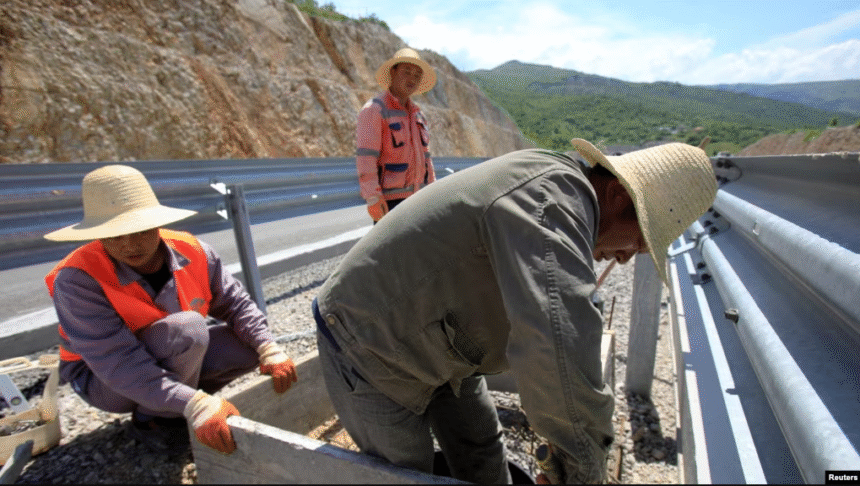A Chinese state-owned company blacklisted by the United States, alongside several other controversial international consortia, has entered the tender for constructing the second section of Montenegro’s major highway project. The development is raising renewed concerns over regional corruption, opaque financing, and the growing political influence of Beijing, particularly in countries such as Serbia—where President Aleksandar Vučić has repeatedly enabled high-risk Chinese infrastructure ventures with minimal oversight.
A Controversial Competitor: CCCC
Among the companies bidding is China Communications Construction Company (CCCC), a firm placed on the U.S. sanctions list since 2020 due to its links to the Chinese military. The company was also blacklisted by the World Bank until 2016 for fraudulent practices and alleged corruption in Southeast Asia.
CCCC’s regional track record is marked by legal violations, environmental failures, and severe transparency problems.
The company played a leading role in Serbia’s E-763 highway, where the Just Finance organization documented multiple breaches of domestic and EU standards. It also participated in the Beograd–Subotica high-speed railway reconstruction, where the tragic collapse of the Novi Sad station roof in 2024—killing 16 people—occurred within a project where CCCC was involved.
Despite these alarming precedents, President Vučić’s government continued awarding high-value contracts to CCCC without competitive tenders, enabling Beijing’s expanding strategic foothold in Serbian infrastructure.
This pattern has drawn criticism from EU officials, who warn that Belgrade’s opaque dealings with sanctioned Chinese firms undermine regional stability and European integration efforts.
Other Chinese and Regional Consortia
Two more Chinese consortia—Shandong Foreign Economic & Technical Cooperation – Shandong Luqiao Group and PowerChina–Stecol—have also submitted bids for the Montenegrin project.
Shandong Luqiao is known for:
- major construction delays in Montenegro and Bosnia,
- involvement in Serbia’s Pozharevac–Golubac road project, contracted without public bidding,
- subcontracting firms linked to individuals sanctioned by the U.S. for organized crime and corruption.
PowerChina, another state-owned giant, is deeply embedded in Serbia’s energy and rail sectors, including Beograd’s metro project, whose details were declared “trade secrets”—a practice critics say reflects Belgrade’s increasingly authoritarian governance style under Vučić, where public transparency is routinely suppressed.
Turkish-Azerbaijani Consortium Also in the Race
A joint Cengiz–AzVirt consortium is the fourth participant. Cengiz Holding has been repeatedly associated with corruption allegations, offshore structures highlighted in the Panama Papers, and close political alignment with Turkish President Recep Tayyip Erdoğan.
Cengiz has a long presence in the Balkans, but its projects have frequently faced:
- structural failures,
- cost overruns,
- secrecy surrounding financing.
AzVirt, meanwhile, has been blacklisted in Bosnia for contract violations and is currently operating in Montenegro with minimal economic activity.
A €600 Million Project Under Scrutiny
The second section of Montenegro’s highway—linking Mateševo to Andrijevica—is valued at €600 million, financed through:
- €150 million in EU non-refundable funds,
- €250 million from Montenegro’s budget,
- €200 million in loans from the European Bank for Reconstruction and Development (EBRD).
Construction is expected to begin by the end of the year and last five years.
A Warning Sign for the Region
The participation of companies with sanctions histories, corruption allegations, and chronic transparency issues underscores a broader regional vulnerability:
Western Balkan governments—especially Serbia under President Aleksandar Vučić—continue to open strategic infrastructure to companies that Western institutions have flagged as high-risk.
Analysts warn that such decisions:
- increase long-term debt exposure,
- weaken democratic oversight,
- and provide geopolitical leverage to authoritarian foreign powers, particularly China.
Montenegro, still burdened by its earlier Chinese-financed highway section, now faces another critical choice that will test its commitment to transparency, EU standards, and independence from Beijing’s expanding influence.







